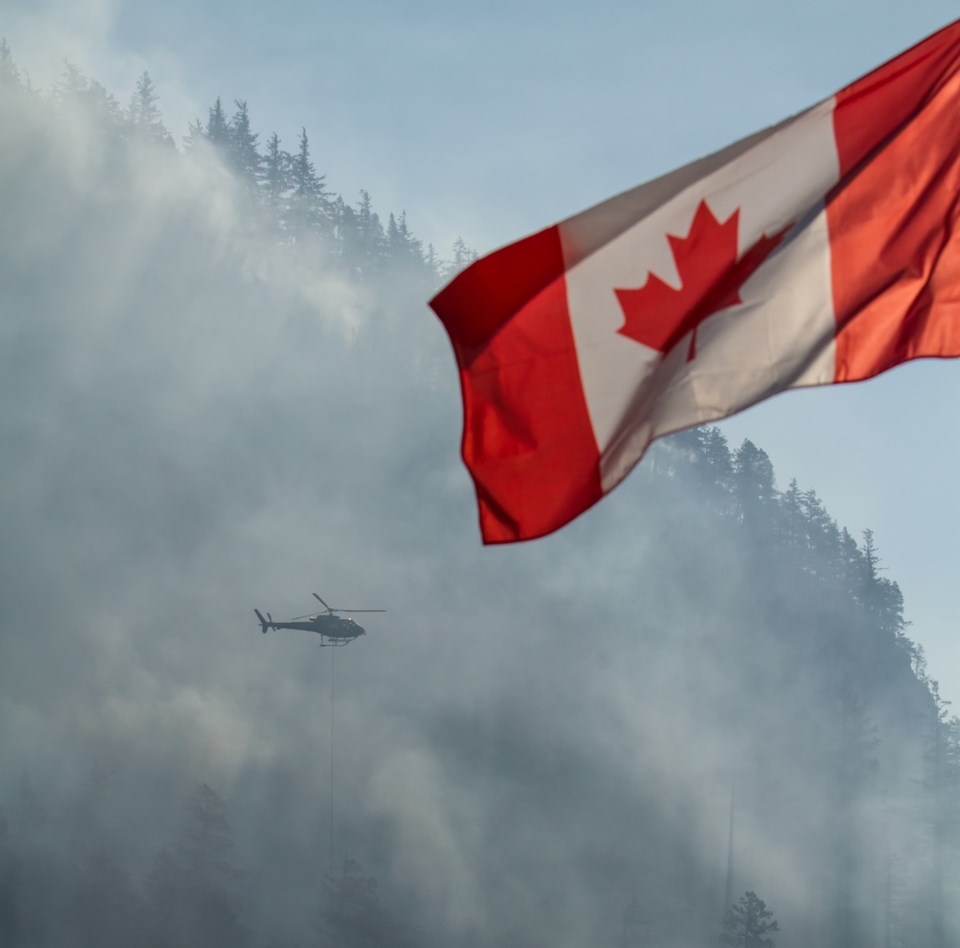What can be said about the brave men and women who responded, day and night for close to a week, to the Dryden Creek wildfire north of Squamish?
And what can be said of the thoughtless individual who presumably started it? (More on that later.)
To the firefighters, both local and provincial; the police officers offering assistance any way they could; the locals sharing photos and offering each other help; even the elected representatives and other officials for sharing consistent, timely messaging: the entire Sea to Sky corridor owes you a debt of gratitude.
Because anyone not living under a rock this past decade, seeing the devastation wrought in towns like Jasper, Alta., and Lytton due to wildfire, knows just how bad the Squamish fire could have gotten.
Cooler fortunes prevailed, in this instance, and as of this writing on June 17, the massive Dryden Creek fire is classified as being held at 59.5 hectares, with no homes or structures lost to the blaze.
Consider it a minor miracle, thanks to the amazing folks mentioned above—and a timely reminder for anyone courting complacency here in Whistler.
As of June 17, Whistler’s fire danger rating was high—but local officials are not taking any chances with possible human-caused fires (as the Dryden Creek fire is thought to be).
Effective June 12, all campfires are prohibited in the resort, regardless of the fire danger rating, until Sept. 15, by directive of Fire Chief Thomas Doherty.
“The campfire ban applies to all levels of fire danger rating including low and moderate, and the campfire ban in Whistler will remain in effect until Sept. 15, 2025 to reduce the risk of human caused wildfires,” reads a post on the Resort Municipality of Whistler’s website.
“A CSA-rated or ULC-rated portable campfire apparatus that uses propane fuel is allowed in Whistler, as long as the height of the flame is less than 15 centimetres, and it is used in accordance with the manufacturer recommendations.”
If you’ve somehow managed to avoid thinking about how a wildfire might impact Whistler, and what you’d do in the event of one, it’s time to change that.
The first call to action is to sign up for Whistler Alert (at whistler.ca/whistleralert), which will be how the Resort Municipality of Whistler communicates timely messaging in the event of any emergency.
But according to former Nelson Fire Chief Len MacCharles, who witnessed the catastrophic effects of wildfire first-hand while serving as incident commander in the aftermath of the Slave Lake fire in 2011, and gave the order to evacuate Calgary during the 2013 floods, there are two main things every individual can do right now to prepare: have a 72-hour kit (containing all the essentials in the event of an emergency: water, food, medication, first aid, important documents, a wind-up flashlight and radio, etc.) and a personal evacuation plan.
“[Evacuating a community] is a huge nightmare,” MacCharles told delegates at a Nelson wildfire conference in 2018. “Even with great planning and trained people, and your community being aware, it’s going to be chaotic.”
Ever try to head south at say, 4 p.m. on a powder day? Now consider what a full-scale Whistler evacuation looks like, with our thousands of tourists, carless seasonal residents, spread out permanent population—chaotic doesn’t begin to describe it. But we can all do our part to curb the chaos by being informed and prepared in the event of an emergency.
Beyond that, individuals can help protect their homes and neighbourhoods by employing FireSmart principles (read more at whistler.ca/firesmart).
But the best fire prevention is to not start them in the first place. So if you’re the kind of selfish, stupid, ignorant piece of work who thinks the rules don’t apply to you, I think I speak for all of Whistler when I say: how dare you?
Wildfire risk aside, starting illegal fires is an expensive game to play: anyone in contravention of a BC Wildfire Service prohibition can be ticketed $1,150, or a penalty up to $100,000, and sentenced to up to one year in prison. If your fire results in a wildfire, you can also be ordered to pay the government’s cost to suppress the fire and other damages.
And if you’re dumb enough to start illegal fires, you probably need this part spelled out, too: it costs a lot of money to fight wildfires in B.C., and even more to replace what they destroy. More than your stupid, illegal-fire-starting ass could ever hope to have.
In Whistler, the fine for having a fire without a permit is $500, reduced to $300 if paid within 14 days. The fine for having a campfire during a ban, as Whistler is now under until Sept. 15, is $1,000. The RCMP and COS can also issue an additional $1,150 ticket for fire-related infractions.
The Whistler Fire Rescue Service can hand out fines, but typically defers to the municipal bylaw department. Since January 1, 2024, two tickets have been issued for open-air burns in Whistler.
For some added context, last year, the estimated cost of wildfire suppression in B.C. was $621 million—and 2025 is already on track to become the second-worst wildfire season in Canada’s history.
Wildfires have already burned 3.7 million hectares across the country this year (since 2014, the annual average is about 800,000 hectares annually), and the season has yet to truly begin. Natural Resources Canada is forecasting extreme fire risk in southern British Columbia in July, while southwestern B.C.—including Vancouver Island—is expected to be hotter and drier than normal.
We can’t control the weather, or dictate when and where a wildfire might hit; can’t stop selfish morons from lighting fires or tossing their cigarette butts.
All we can really do is be prepared. So best be prepared.
Find more info and resources at whistler.ca/wildfire. See smoke? In Whistler, report it by calling 911. Outside municipal boundaries, call 1-800-663-5555 or *5555 on a cell phone.




